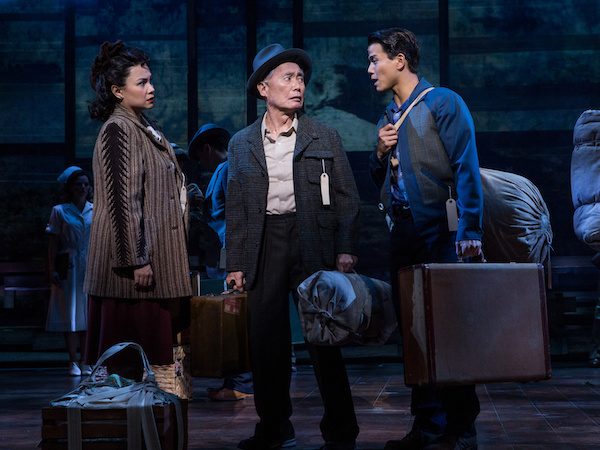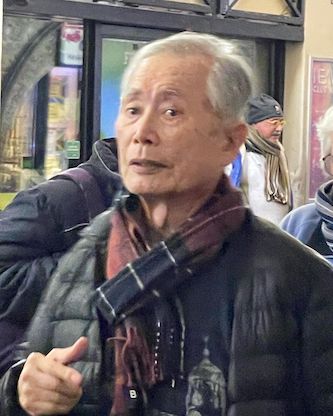Theater Commentary: George Takei’s “Allegiance” — Taking Yanks to Task
By Thomas A. Underwood
George Takei’s musical Allegiance projects American democracy as it might have become.

Lea Salonga, George Takei, and Telly Leung in Allegiance. Photo: Matthew Murphy
There is a clear advantage for American tourists in London who wait for Broadway shows to cross the pond before taking them in. New casts tapping London’s deep and multiethnic well of talent often bring fresh energy and strikingly original interpretations to New York plays and musicals. A prime example is the current West End production of George Takei’s Allegiance, a musical (music and lyrics by Jay Kuo and book by Marc Acito) which ran on Broadway from 2015 to 2016. Boasting a London-based cast dripping with talent, all held together by Takei, this production of Allegiance is a paean to London’s multiculturalism and the model it offers contemporary American democracy. The West End cast includes not only Japanese nationals and Japanese Americans but also Chinese Americans, Filipinos, Singaporean Chinese, Brits of Japanese, Thai, and Chinese descent — and a handful of actors from a white British background — all playing US citizens. Like the USS Enterprise, the starship on the American television show in which Takei played helmsman Hikaru Kato Sulu, Allegiance projects American democracy as it might have become.
The musical’s historical backdrop is a painfully familiar — and undemocratic — one to Americans: after the Japanese bombing of Pearl Harbor, loyal, productive, and family-oriented Japanese American citizens were rounded up, often violently, and relocated to grotesquely uninhabitable camps in inhospitable regions far from California — in arid, dusty states such as Wyoming — and interned there for the duration of World War II. Allegiance opens long after these events when a young woman knocks on the door of Sam Kimura, an elderly Japanese American (played by Takei) who served heroically in World War II, and lets him know that his sister, from whom he has been estranged for more than 50 years, has died. From that moment forward, the offshore production calls into renewed focus the persistent conflict in the US between patriotism and domestic xenophobia.

George Takei today. Photo: Thomas A. Underwood
Enveloped by younger talent, Takei serves as both a foil for and the cynosure of the London-based cast. For many Americans of the baby boomer generation, Takei’s capacity to inspire and challenge others politically is part of our cultural memory. In my case, I vividly remember, at the age of seven — in the fall of 1966 — straining to stay awake until 8:30 p.m. to watch the early episodes of Star Trek with our suburban neighbors in the family living room. Takei’s Sulu, one of my favorite characters, broke new ground in the representation of Asians on American television. Vietnam War protests in the United States were burgeoning at the time but, only five years earlier, in the film Breakfast at Tiffany’s (1961), white actor Mickey Rooney offered the racist burlesque of Japanese landlord “Mr. Yunioshi.” By comparison, Takei played Sulu as professional, dignified, indispensable, and equal. Plus ça change, plus c’est la même chose. In 2023, for an American in London to see Takei, a senior citizen diminished in physical stature but not in his stage presence, his acting gifts, or his ethos, playing an elderly Japanese American veteran in a World War II uniform for a Pearl Harbor Day parade in the ’90s, makes Allegiance a distant mirror reflecting America’s still-unrealized promise of inalienable rights for all.
Takei is an actor, influencer, and activist who has more than 32 million followers on Twitter. But he is remarkably modest in person. Emerging from the stage door after a performance that elicited a standing ovation from a sold-out audience — many of whose members were still red-eyed and at least one shouting “Bravo!” — he demurred, “No — it was the cast.” I was lucky enough to be standing near the front of the line and was able to converse briefly with him. I told Takei how moved I was by the performance, and, twinkle in his eye, he replied, “We heard the sniffling!” Turning somber, however, he looked me in the eye and said, “It’s a true story. When I was four years old, my family and I were taken away at gunpoint.” Meanwhile, he took time signing my program in meticulous and elegant handwriting.
Thanking him and handing Takei his Sharpie back, I spotted Raiko Gohara, the youngest member of the musical’s cast, standing nearby. He was, just as modestly, conversing with a tourist who had just emerged from the theater. As a retired professor who spent decades teaching first-year college students in the United States, I was struck during the performance by the obvious youthfulness of Gohara, a gifted singer and dancer, whom I learned from the program is a third-generation Japanese American from a family well acquainted with the Japanese internment. I approached him and said, “Wow — you were terrific! I am curious: how old are you?” “I am 19,” he replied, smiling broadly. The smile said it all: a happy and gifted young actor making his theatrical debut in a morally profound play — and with his entire life ahead of him! Something made me turn my head to look back at the 85-year-old Takei. He was still signing programs. In that moment, I felt humbled by Japanese Americans and all they have endured, proud to be with them in London, and grateful for those magical West End thespians who still try, against the odds, to make London a city on a hill, a miniature democracy that makes Americans recall their mission.
Dr. Thomas A. Underwood is an Instructor in the Harvard University Division of Continuing Education.
Tagged: Allegiance, George Takei, Lea Salonga, musical, Telly Leung

Very thoughtful essay, with an inspiring blend of realism and hope. Thank you!
A very well written account of both the play and also the emotional effects of meeting. Takei and Gohara ! Well done
Love this Tom! Great to hear your voice shining through.
Keep up this critical commentary, Tom. It’s a fascinating situation, an all-too-American story finding new life in the West End.